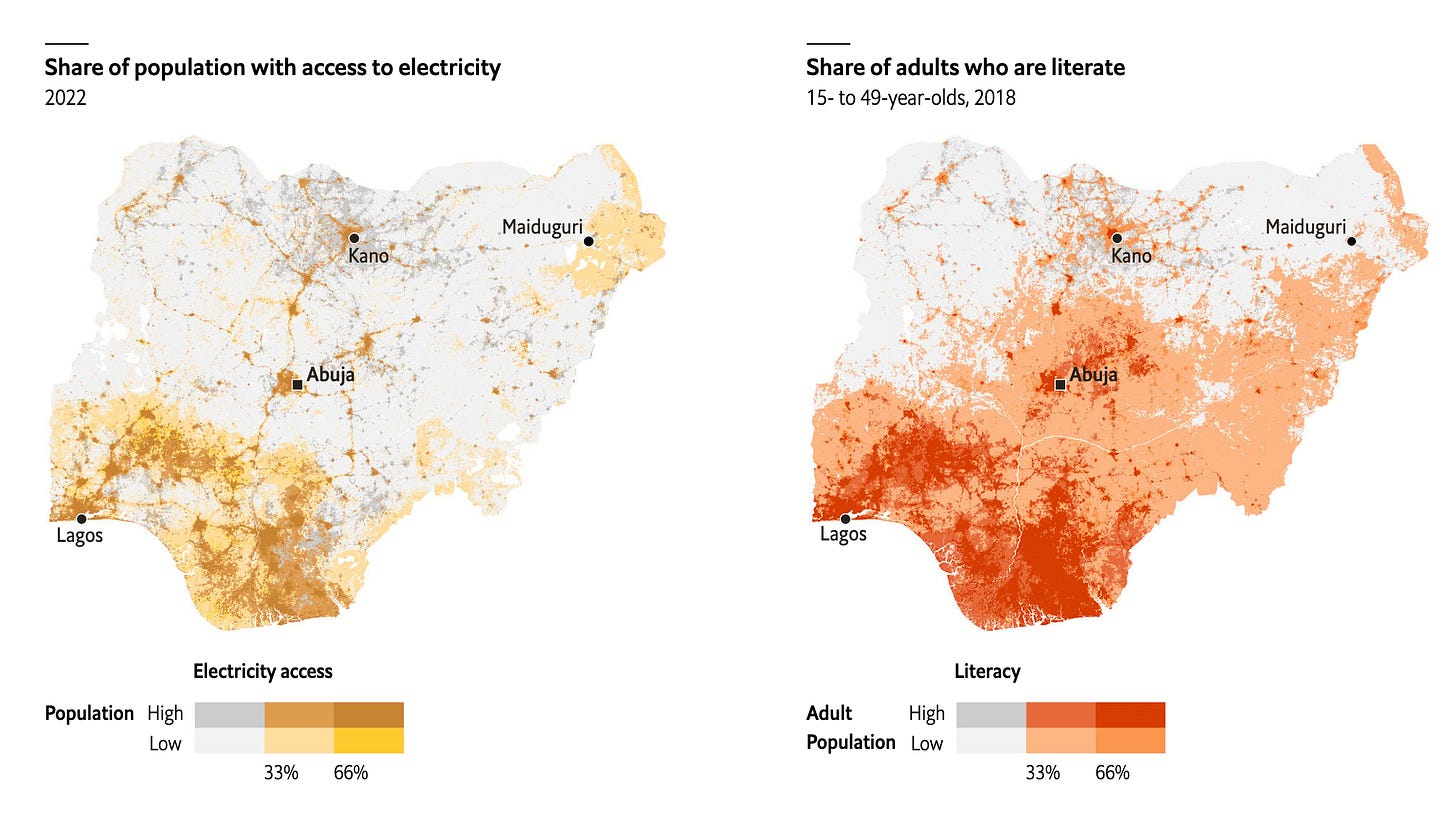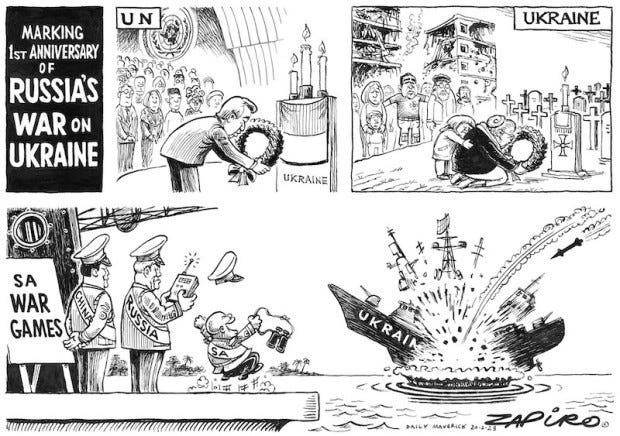Dear Africa Brief,
TL;DR:
Nigeria, Africa's biggest democracy, heads to the polls
Jeremy Farrar, WHO Chief Scientist warns of H5N1 (bird flu) jumping to humans — we should start developing vaccines
South Africa gets cosy with Russia and China — an expansion of the Sino-Russian sphere of influence
The UN's Giga partners with the Africa CDC to connect thousands of healthcare sites across the continent, and
Major African corporations merge.
w/o 20 Feb - 27 Feb 2023
Graphics of the Week
*Credit: The Economist
A tale of two poles: this weekend Africa’s largest democracy heads to the polls. Politics in Nigeria is shaped by stark contrasts between its northern and southern regions.
Business in Africa
Africa’s energy markets remain on a high. Engen announced plans to merge its African operations with those of UK-based Vivo Energy to create one of the African continent’s largest energy distribution companies. Combined, the group will have more than 3 900 service stations and 2 billion litres of storage capacity across 27 African countries. The companies did not disclose the value of the merger.
In the run-up to Nigeria’s elections on Feb. 25, Nigerians are waiting hours for money and fuel amid an acute cash and gasoline shortage in a country that was once Africa’s largest producer of petroleum.
South Africa hosted the world's largest mining investment conference — the African Mining Indaba in Cape Town. Industry experts in attendance reflected on a renewed interest in the African minerals and energy sectors as the U.S. and China are in a race for the critical minerals — such as cobalt and lithium — that will power the transition to clean energy.
Kenya is racing to build Africa’s first privately-owned power transmission lines covering 237 km or 150 miles at the cost of KSh37.65bn (US$298m). The public-private partnership (PPP) is being developed by pan-African investment firm Africa50, with Power Grid Corporation of India Limited (of which the Indian government holds a 51.34% stake) being a technical and minority equity partner.
Africa’s largest insurer, Sanlam, offered to buy a controlling stake in AfroCentric. If the proposed transaction proceeds, Sanlam will hold a majority of 55%-60% of AfroCentric’s shares. AfroCentric, which owns South Africa’s second-biggest medical scheme administrator Medscheme, has long been vocal about stagnant medical scheme membership and that far more urgency is needed to change legislation to allow for lower-cost alternatives.
China in Africa
In a message to the 36th African Union Summit held at the AU headquarters in Addis Ababa, President Xi congratulated the AU representatives and assured the regional bloc that China will maintain its friendship and cooperation with the continent under those principles espoused in the Forum on China-Africa Cooperation (China Daily).
*Credit: The Economist
Climate in Africa
Somalia, Kenya and Ethiopia are experiencing a drought worse than that which induced the 2011 famine — where hundreds of thousands of people starved to death. UN Secretary-General Antonio Guterres said on Wednesday that 8.3 million people – more than half Somalia’s population – will need humanitarian assistance this year.
Democracy in Africa
Cyril Ramaphosa, South Africa’s president, declared a “state of disaster” in response to an electricity crisis which saw planned power outages of up to 10 hours a day. The outages are a result of government mismanagement.
Zimbabweans head to the polls this year for a democratic election in name only. Public frustration with the ruling Zanu-PF is boiling over into violence between its supporters and activists of the Citizens Coalition for Change (CCC).
Health in Africa
Incoming WHO Chief Scientist Jeremy Farrar has urged the development of bird flu vaccines, citing the spread of the H5N1 bird flu virus as the world’s biggest pandemic threat since COVID-19 (The Telegraph).
The Africa CDC is partnering with Giga (a program to connect every school in the world to the internet) to map thousands of health facilities across the continent. Giga’s mission is admirable, applying open-source tools to enable collaboration across sectors to connect the 2.7 billion people worldwide who still do not have internet access. The effort has helped governments in low- and middle-income countries raise more than $600 million, including loans from development finance institutions and international financial institutions, government connectivity funds, and donations ranging from telecommunications giant Ericsson to the Musk Foundation, the charity of SpaceX and Twitter CEO Elon Musk.
Equatorial Guinea is battling its first outbreak of Marburg disease, a highly infectious hemorrhagic fever from the same viral family as Ebola. There are no vaccines or antiviral treatments approved for the virus yet, but researchers held an emergency meeting yesterday to examine rolling out clinical trials for the current outbreak. The virus spills over from fruit bats to humans and, once transferred, can spread through bodily fluids and persist for several days on surfaces.
Europe in Africa
This week South Africa hosted military exercises with China and Russia which coincided with the first anniversary of Vladimir Putin’s invasion of Ukraine. The country insisted that the exercises were planned two years ago.
The Economist writes this week that the ruling party’s elite (the ANC) are partial to the Russian Federation, a consequence of history as the USSR supported the ANC during the apartheid years (it is not lost on me that Ukraine was then part of the Soviet bloc). On average South Africa matched only 23% of America’s votes annually between 2017 and 2021, according to analysis by The Economist, ten percentage points lower than the average for all countries—almost as divergent as nations such as Cuba and Zimbabwe. It was among the minority of UN members that did not condemn Russia’s invasion of Crimea in 2014.
From the bottom of the continent to the top of it, Algeria has recalled its ambassador to France for consultations in a new spat over the evacuation of Algerian activists. This is the second time that Algeria has recalled its Ambassador to France for consultation over the past two years.
The Financial Times this week reports on Moscow’s second front — Africa. Its report would be familiar to you Africa Brief readers, the Kremlin controls vast mineral resources and in some cases has taken on ‘client states’ in the Central African Republic, Sudan, and Mali. Russia frequently garners the support of African states in the UN.
Not to be outdone on the diplomatic front, Ukraine has launched a training course for diplomats from African countries, as part of an effort to strengthen relations with the continent, Foreign Minister Dmytro Kuleba said.
Russia’s nuclear giant, Rosatom PJSC, is on the hunt for nuclear energy deals on the African continent. According to News24, Rosatom chief Alexey Likhachev says the company is in talks with about 10 countries on new projects, and three or four are close to signing inter-government deals. In all the countries where Rosatom is already building nuclear plants, ‘everything is on track.’ Everytime a country agrees to build a new reactor, it locks in cash flows and political clout for decades.
African countries have rallied to long-time ally Turkey in sending multiple rescue teams. Burundi, Libya, Algeria, Egypt, South Africa, Sudan, and Tunisia have all sent resources to support the rescue efforts.
And the French have officially left Burkina Faso. The Financial Times reports that the end of the French mission, Operation Barkhane, underlines the deteriorating relations between the former colonial power and the country today. The vacuum left by the French withdrawal will be filled by the Wagner Group, a Russian private military company founded by Yevgeny Prigozhin, an ally of Russian President Vladimir Putin.
Peace and Security in Africa
Botswana canceled at the last minute a meeting with Russia's Foreign Minister without explanation.
Two members of the US House of Representatives’ Foreign Affairs Committee have written to President Joe Biden to rescind a ~$1bn arms sale to Nigeria following reports on an illegal abortion programme and the targeted killing of children by the Nigerian military.
The UN published a report on the prevalence of child soldiers on the continent, citing that half of the 14 countries that recruited children into armed conflict are in Africa — the continent is home to 40% of the world's child soldier population, estimated to be 250 000.
US in Africa
U.S. first lady Jill Biden visits Namibia and Kenya this week on a continued US push to counter Russian and Chinese diplomatic influence. The First Lady is the third U.S. official to visit Africa this year, following Treasury Secretary Janet Yellen and U.S. Ambassador to the United Nations Linda Thomas-Greenfield.
In combination with its diplomatic push, the US foreign aid agency, the Millennium Challenge Corporation (MCC) invested in a regional compact to the sum of $504 million — $202 million for Benin and $302 million for Niger — focused on reducing transportation costs between Benin’s Port of Cotonou and Niger’s capital of Niamey.







